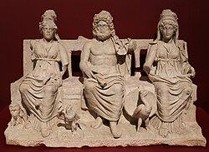An Impossible Choice (part 1 of 3)
Why Were Early Christians Persecuted? 
The Roman Empire’s persecution of Christians began sporadically but escalated over the centuries, starting in 64 AD under Emperor Nero and ending in 313 AD when Constantine legalized Christianity across the empire. However, despite this long period of persecution, most emperors showed no animosity toward the small, upstart Christian sect. The question remains: why were Christians specifically targeted, and martyred, whether by Nero tying them to stakes, tarring them, and setting them on fire as human torches, or being torn apart by lions in the arena to the applause and cheers of festive game attendees. (Martyrdom of Polycarp)
Rome’s Religion and Political Identity
 The Roman Empire was famously polytheistic, incorporating gods from many cultures it conquered into the state religion. This policy was a political strategy that allowed the assimilation of a stunning array of gods and practices, all under one big tent, or rather one expansive empire. Worship of these gods and goddesses, particularly the emperor himself (who was considered divine), was seen as a civic duty, an integral part of being Roman. (Capitoline Triad of Juno, Jupiter, and Minerva)
The Roman Empire was famously polytheistic, incorporating gods from many cultures it conquered into the state religion. This policy was a political strategy that allowed the assimilation of a stunning array of gods and practices, all under one big tent, or rather one expansive empire. Worship of these gods and goddesses, particularly the emperor himself (who was considered divine), was seen as a civic duty, an integral part of being Roman. (Capitoline Triad of Juno, Jupiter, and Minerva)
For Romans, religion was not a particularly personal matter, but rather one enacted through  visible family and public rituals, festivals, sacrifices, and processions. A city’s gods were a reflection of its civic and political identity. In this context, religion was a mechanism for social unity and political loyalty.
visible family and public rituals, festivals, sacrifices, and processions. A city’s gods were a reflection of its civic and political identity. In this context, religion was a mechanism for social unity and political loyalty.
In my previous blog, “Mean Gods,” I described the control that the Greek and Roman religious system had over the
people. From birth to death, the gods were feared and needed to be appeased. Celebrations, sacrifices, and prayers were overseen by public officials, primarily the Roman Senate.
Why Were Christians Targeted?
 If so many divinities were brought to Rome and installed as part of the Roman state religion, why not Christianity?
If so many divinities were brought to Rome and installed as part of the Roman state religion, why not Christianity?
Christians were exhorted by their scriptures and spiritual leaders to be “good” law-abiding citizens. They paid taxes, helped widows and orphans, and believed in Christ’s commandment. ‘Therefore, whatever you want men to do to you, do also to them.’ (Matt. 7:12 NKJV) They weren’t rioting or demanding special concessions; they were simply different. Perhaps, Christ would have been accepted as one of Rome’s many gods had His adherents agreed that He was just one of many. (Marcus Aurelius (head covered) sacrificing at the Temple of Jupiter)
They did not.
Unlike the general populace, Christians were not willing to accept the Roman gods as legitimate. The followers of Jesus Christ had a radically different belief system—they were monotheistic and could not reconcile their faith with the polytheistic practices of Rome.
Christian exclusivity could accept only one divinity, and it wasn’t Caesar.
Bibliography
Pictures from Wikipedia
-Cairns, Earle E. (1996). “Chapter 7:Christ or Caesar”. Christianity Through the Centuries: A History of the Christian Church (Third ed.). Grand Rapids, Michigan: Zondervan. ISBN 978-0-310-20812-9.
-Clark, Mark Edward (1983). “Spes in the Early Imperial Cult: “The Hope of Augustus””. Numen. 30 (1): 80–105. doi:10.1163/156852783X00168. JSTOR 3270103
– Whitby, Michael; Streeter, Joseph, eds. (2006). Christian Persecution, Martyrdom, and Orthodoxy GEM de Ste.Croix. New York: Oxford University Press. ISBN 978-0-19-927812-1.
–Jump up to:a b Catherwood, Christopher (2011). “Chapter Three, From Christ to Christendom: The Early Church”. A Brief History of the Middle East (Second ed.). London: Constable and Robin Ltd. ISBN 978-1-84901-508-0.
-A Short History of the Early Church, By Harry R. Boer page 45
–Bart D. Ehrman, A Brief Introduction to the New Testament (Oxford University Press 2004 ISBN 978-0-19-536934-2), pp. 313–314
-Bryant, Joseph M. (1993). “The Sect-Church Dynamic and Christian Expansion in the Roman Empire: Persecution, Penitential Discipline, and Schism in Sociological Perspective”. The British Journal of Sociology. 44 (2): 303–339. doi:10.2307/591221. JSTOR 591221.